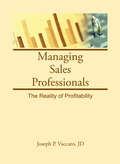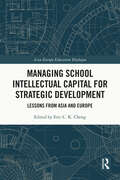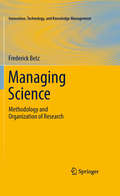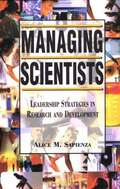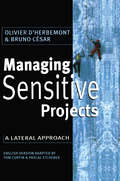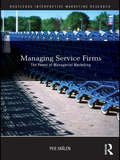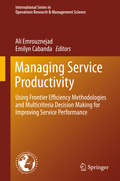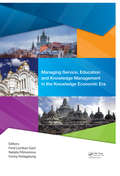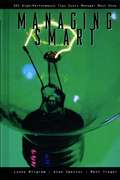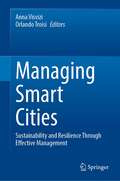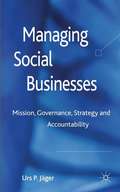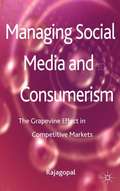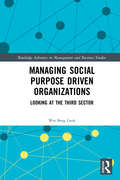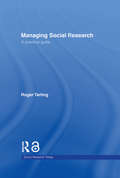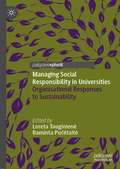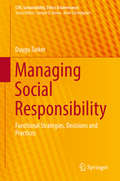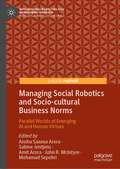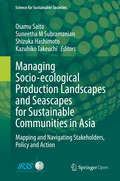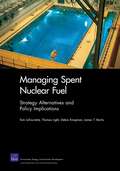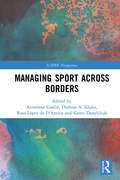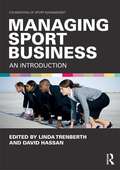- Table View
- List View
Managing Sales Professionals: The Reality of Profitability
by William Winston Joseph P VaccaroThis book is designed for sales managers as they make decisions and solve problems on a day-to-day basis. Managing Sales Professionals provides readers with specific details and illustrates how to plan, organize, staff, operate, and evaluate a sales force and its activities. This book offers an approach that is practical and realistic--one that is needed by sales managers who want to oversee a successful sales staff.The author, Joseph Vaccaro, uses an “integrated model” approach. He integrates the marketing mix as it relates to selling, and then he delves into the daily situations and problems readers encounter as practicing sales managers. With cases at the end of each chapter that make the chapter material come to life, Managing Sales Professionals is a practical tool for those in the world of marketing and sales management. It is a realistic, pragmatic, practical, how-to approach that explains complex concepts in a clear and concise manner. Vaccaro avoids generalities, and he cuts right to the critical specifics for sales managers in the real world.Terms and concepts are clearly defined, and each chapter concludes with penetrating questions to further develop your sales management skills. Along with a highly pertinent chapter on legal and ethical aspects in selling, Managing Sales Professionals covers:how to recruit salespeoplemotivation proceduresgender and racial diversity of the sales forcehow to plan and conduct a training programeffective selling techniqueshow to develop brand awarenessnew sales technologyhow to determine pricing and discount policiescompensation policieshow to determine transportation policiescontrol and evaluation procedureshow to effectively interact with marketingAnyone looking to increase sales, such as business owners, consultants, marketing professionals, and practicing salespeople and sales managers, can use this book to examine their sales staffs and look for areas in which to improve. Managing Sales Professionals is also ideal for upper level undergraduate students as they learn the basics of how to sell, organize, and run a sales force.
Managing School Intellectual Capital for Strategic Development: Lessons from Asia and Europe (Asia-Europe Education Dialogue)
by Eric C. K. ChengCheng articulates the extent to which knowledge management approaches can create intellectual capital (IC) and contribute to improvements in education quality. He argues that public schools have long contended with the requirements of quality assurance in a competitive environment of decreasing student numbers, increasing parental choice and rising standards of accountability. As public organizations, schools have to demonstrate appropriate resource management and show evidence that they are meeting defined development plans and goals. Cheng proposes a strategic approach, Intellectual Capital management, to help schools respond to and cope with the increasingly competitive environment while enhancing school capacity for improving student learning. First, the book guides readers to understand the development of IC theory in the context of education to address the requirements of quality assurance and accountability. It then introduces Lesson Study, e-Learning and ICT as key resources and drivers for building school IC, and examines the organisational factors that enable knowledge management approaches for developing IC in schools from both Asia and Europe. It concludes by offering strategies and implementation methods to manage school IC for sustainable development. Combining research from Asia and Europe, this edited volume will be useful for school leaders and policy makers, as well as those researching school leadership and intellectual capital.
Managing Science
by Frederick BetzWhat is science? How is it performed? Is science only a method or is it also an institution? These are questions at the core of Managing Science, a handbook on how scientific research is conducted and its results disseminated. Knowledge creation occurs through scientific research in universities, industrial laboratories, and government agencies. Any knowledge management system needs to promote effective research processes to foster innovation, and, ultimately, to channel that innovation into economic competitiveness and wealth. However, science is a complicated topic. It includes both methodological aspects and organizational aspects, which have traditionally been discussed in isolation from each other. In Managing Science, Frederick Betz presents a holistic approach to science, incorporating both philosophical and practical elements, in a framework that integrates scientific method, content, administration and application. Illustrating all of the key concepts with illustrative case studies (both historical and contemporary, and from a wide spectrum of fields), Betz provides in-depth discussion of the process of science. He addresses the social, organizational, institutional, and infrastructural context through which research projects are designed and their results applied, along the path from experimentation to innovation to commercialization of new products, services, and processes. This practical approach to science is the foundation of today's knowledge-intensive and technology-enabled industries, and positions the management of science within the broader context of knowledge management and its implications for organizations, industries, and regional and national technology management policies. Managing Science will be an essential resource for students in all areas of research, industry scientists and R&D specialists, policymakers and university administrators, and anyone concerned with the application of research to economic growth and development.
Managing Scientists: Leadership Strategies in Research and Development
by Alice M. SapienzaIn today's climate of enormous scientific and technological competition, it is more crucial than ever that scientists' involvement in research and development be managed well.
Managing Segway's Early Development
by David Kiron Richard G. HamermeshDescribes the early development of the Segway Human Transporter and focuses on the organizational issues that arise between the parent company and the new company that is being spun out to produce and market the Segway. Key issues are the distribution of bonuses and stock options.
Managing Selling and the Salesperson
by Frank V. CespedesWritten for a module in the Marketing Implementation course (a second-year elective in the MBA program). Provides a brief introduction to common issues involved in recruiting, training, compensating, and evaluating field salespeople. Also offers questions to consider concerning these topics in case analysis.
Managing Sensitive Projects: A Lateral Approach
by Olivier D'Herbemont Bruno CesarEvery day, managers must adapt to rapidly changing markets and situations. This book deals with sensitive or difficult projects, ranging from redundancy programs to disposal of radioactive waste, from the launch of a new product to the introduction of a new computer system. The authors use a revolutionary way to manage sensitive projects--the lateral approach. Derived from twenty years' experience working with managers, the lateral approach is a flexible and non- confrontational method that introduces change through an understanding of how people think and act. While communities and organizations often resist change even though they will benefit from it, this approach shows how projects can be successfully managed.
Managing Service Firms: The Power of Managerial Marketing
by Per SkålénBased on a conceptual analysis of marketing texts, particularly service marketing texts, and a case study of a service firm that utilizes approaches to managing organizations that have been developed within the boundaries of marketing, this book presents a critical examination of marketing as a managerial practice. Skålén focuses in particular on the managerial research tradition and managerial practice referred to as service marketing (sometimes service management), which is seen as a ‘dominant managerial logic’ by many marketing scholars. Skålén analyzes the governmentality of service marketing through textual representations of managerial marketing and a case study of a service organization. Based on the former, the author argues that managerial marketing has always promoted and fostered customer orientation as the main governmental rationality and that this rationality in service marketing targets human beings more exclusively than previously. This book contributes to critical marketing research since this research tradition lacks studies of empirical responses to managerial marketing which articulate a radical social critique.
Managing Service Food And Beverage Operations
by Ronald Cichy Philip HickeyManaging Service in Food and Beverage Operations shows students how food service professionals create and deliver guest-driven service; enhance value, build guest loyalty, and promote repeat business; and continuously improve the process of providing excellent service. Students will learn how every aspect of a food service operations contributes to the guest experience and will explore unique features of a variety of food and beverage operations.
Managing Service Productivity
by Ali Emrouznejad Emilyn CabandaThis volume describes how frontier efficiency methodologies such as Data Envelopment Analysis (DEA) and other techniques such as multi-criteria decision making can help service industries to improve their performance by providing a ranking of best-practice efficient service units and by identifying sources of inefficiency for each service unit. It explains how they can be used to determine potential improvement targets for each of the inefficient service units, to identify peers for each service organization and to provide a basis for continuous performance improvement. Presenting applications in a variety of industries, this book will be useful for the service management to improve service productivity, profitability, sustainability and quality and effectiveness of service deliveries. A free trial version of the World's leading Data Envelopment Analysis Software (PIM-DEA) is available for readers of this book.
Managing Service, Education and Knowledge Management in the Knowledge Economic Era: Proceedings of the Annual International Conference on Management and Technology in Knowledge, Service, Tourism & Hospitality 2016 (SERVE 2016), 8-9 October 2016 & 20-21 October 2016, Jakarta, Indonesia & Vladimir State University, Vladimir, Russia
by Ford Lumban Gaol, Natalia Filimonova and Fonny HutagalungManaging Service, Education and Knowledge Management in the Knowledge Economic Era contains papers that were originally presented at the 2016 International Congress on Management and Technology in Knowledge, Service, Tourism & Hospitality (SERVE 2016), held 8-9 October 2016 & 20-21 October 2016, in Jakarta, Indonesia & at the Vladimir State University, Vladimir, Russia. The contributions deal with various interdisciplinary research topics, particularly in the fields of social sciences, education, economics and arts. The papers focus especially on such topics as language, cultural studies, economics, behavior studies, political sciences, media and communication, psychology and human development. These proceedings should be of interest to academics and professionals in the wider field of social sciences, including disciplines such as education, psychology, tourism and knowledge management.
Managing Smart
by Lynne Milgram, M.D., MBA Alan Spector, Ph.D., M.D. Matt Treger'Managing Smart' examines the challenges facing today's management and provides fast, practical answers for solving common workplace situations. It presents step-by-step instructions for mastering more than 300 key real-world management tasks. This condensed business guide includes information on: * Leadership techniques * Labor management * Strategic planning * Time management * Marketing and sales techniques * Career development * Key business concepts * Management tools * Information systemsAmong many other management topics, 'Managing Smart' also shows you how to: * Set project goals and priorities * Increase efficiency * Comply with employment and labor benefits * Manage financesManagement professionals and novices alike will improve their effectiveness, skills, and knowledge with these concise reference tips.
Managing Smart Cities: Sustainability and Resilience Through Effective Management
by Anna Visvizi Orlando TroisiThis book adopts the managerial perspective to the study of smart cities. As such, this book is a necessary addition to the existing body of literature on smart cities. The chapters included in this book prove the case that transformation of cities to smart cities is a function of effective and efficient management practices implemented at diverse levels of smart cities. While advances in information and communication technology (ICT) are crucial, it is the ability to apply ICT consciously and efficiently that drives the transformation of cities to smart cities in a manner conducive to cities’ sustainability and resilience.The book covers three sets of interconnected topics:Management and decision-making for urban design and infrastructure developmentManagement and decision-making in context of smart cities developmentWays of promoting and ensuring participation, representation and co-creation in smart cities These three groups of topics offer a great opportunity to acquire a clear, direct, and practice-driven knowledge and understanding of how effective management allows ICT-enhanced tools and applications to change smart cities, possibly making them smarter.
Managing Social Businesses
by Urs P. J�gerSocial businesses and non-profit organizations act at the interface of markets and civil societies. Their executives are challenged by issues of social mission and economic rationale. This book presents a new concept of social businesses and a framework for the mission and strategy-related decision making in this complex concept.
Managing Social Media and Consumerism
by RajagopalCategorically reviews the theories of communication, best practices in social media and previous research, and analyzes the corporate involvement towards strategic and tactical stewardship in serving customer-centric business requirements.
Managing Social Purpose Driven Organizations: Looking at the Third Sector (Routledge Advances in Management and Business Studies)
by Wee Beng GeokThe book examines the management of social purpose driven organizations in an Asian context, using the case study approach. It looks at these organizations during a period of major changes in the regulatory and governance environment for charities in Singapore. The focus is on how these changes impact the organizational and management issues confronting several charities and volunteer welfare organizations, an arts enterprise, a co-operative and a non-governmental organization in international disaster relief. Although diverse, the common denominator among these organizations is their commitment to a core social purpose. Issues examined include: organizational restructuring, crisis management, organizational change management, social entrepreneurship and organizational sustainability. The book adopts a systemic perspective in examining the challenges of managing organizations that are neither state-owned nor private enterprises, and in particular, the interrelationships between contexts, actions and outcomes and their impact on the organizations, their stakeholders and external environments.
Managing Social Research: A Practical Guide (Social Research Today)
by Roger TarlingAn essential tool for those planning to undertake social research, this exceptional book tackles many of the specific concerns and issues that arise. A well structured text, it offers a comprehensive introduction to a range of important areas in project management, including: commissioning research preparing a tender or grant application risk and stakeholder analysis managing the field work and data analysis financial management ethics, confidentiality and copyright. This book provides a unique source of guidance for anyone seeking to commission, manage or carry out social research. It will especially benefit researchers working in a variety of different contexts, including those in academia, central or local government, 'quangos', public bodies or private consulting companies.
Managing Social Responsibility in Universities: Organisational Responses to Sustainability
by Loreta Tauginienė Raminta PučėtaitėThis book explores the concept of university social responsibility, drawing on a wide range of geographical perspectives, such as China and Germany. It also examines the diverse aspirations of universities, from preserving authenticity and safeguarding Catholic values, to embedding sustainability into the community. It provides a storytelling framework for teaching sustainability in management education as an approach to strengthening the social role of universities and showcases how a service-learning approach could promote the engagement of universities within the community. This book is valuable reading for academics who are researching sustainability management, corporate and organisational social responsibility and other related social sciences. It has interdisciplinary appeal for scholars and serves interesting for practitioners.
Managing Social Responsibility: Functional Strategies, Decisions and Practices (CSR, Sustainability, Ethics & Governance)
by Duygu TurkerThis book explores how business organizations incorporate socially responsible approaches into their diverse functional strategies, decisions, and practices. It analyzes the nature and dynamics of each function as well as their specific characteristics in the formulation of sustainable strategies and decisions. As such, the book comprehensively aligns recent approaches on social responsibility and sustainability with real-world practices.By viewing corporate social responsibility (CSR) as the catalyzer of United Nations’ Sustainable Development Goals (SDGs) at the organizational level, this book introduces readers to the latest thinking and best practices towards the accomplishment of those overarching goals of humanity. Cases and examples from production, marketing, finance, accounting, human resources, and all parts of the enterprise make this book a valuable resource for scholars, students, up-and-coming managers and practitioners alike.
Managing Social Robotics and Socio-cultural Business Norms: Parallel Worlds of Emerging AI and Human Virtues (International Marketing and Management Research)
by Anshu Saxena Arora John R. McIntyre Mohamad Sepehri Amit Arora Sabine JentjensThis book explores the co-existence of humans and AI in business contexts. Though AI and social robots have become ubiquitous, there are still many challenges facing technological expansion, including a true understanding of abstract concepts, transfer of knowledge to novel application problems, transparency and security guarantees, and distinguishing between random and logically meaningful relationships. While machines are valuable tools, only humans are capable of recognizing values which are the key to ethics and socio-cultural norms. Further, human virtues such as emotional intelligence, wisdom, and courage are required for decision making in many (private and professional) situations where machines would lead to sub-optimal and/or ethically questionable business outcomes.This book discusses how digital technology has emerged as a critical support system for organizations during the COVID-19 pandemic and how it can be used to complement human qualities that machines lack. It is divided into three sections that examine the complex world of AI and social robotics, digital technology and social media roles in business, and human actions that are embedded within socio-cultural business norms, such as international negotiations, that are not yet replaceable by AI.For researchers interested in understanding these parallel worlds, this book assesses how can continue to not only coexist but mutually benefit the business ecosystem.
Managing Socio-ecological Production Landscapes and Seascapes for Sustainable Communities in Asia: Mapping and Navigating Stakeholders, Policy and Action (Science for Sustainable Societies)
by Osamu Saito Kazuhiko Takeuchi Suneetha M Subramanian Shizuka HashimotoThis open access book presents up-to-date analyses of community-based approaches to sustainable resource management of SEPLS (socio-ecological production landscapes and seascapes) in areas where a harmonious relationship between the natural environment and the people who inhabit it is essential to ensure community and environmental well-being as well as to build resilience in the ecosystems that support this well-being. Understanding SEPLS and the forces of change that can weaken their resilience requires the integration of knowledge across a wide range of academic disciplines as well as from indigenous knowledge and experience. Moreover, given the wide variation in the socio-ecological makeup of SEPLS around the globe, as well as in their political and economic contexts, individual communities will be at the forefront of developing the measures appropriate for their unique circumstances. This in turn requires robust communication systems and broad participatory approaches.Sustainability science (SuS) research is highly integrated, participatory and solutions driven, and as such is well suited to the study of SEPLS. Through case studies, literature reviews and SuS analyses, the book explores various approaches to stakeholder participation, policy development and appropriate action for the future of SEPLS. It provides communities, researchers and decision-makers at various levels with new tools and strategies for exploring scenarios and creating future visions for sustainable societies.
Managing Spent Nuclear Fuel
by Tom Latourrette Thomas Light James T. Bartis Debra KnopmanNuclear power is receiving renewed interest because of its low greenhouse gas emissions. However, if nuclear power is to be sustainable option for the United States, methods for managing spent fuel that meet stringent safety and environmental standards must be implemented. This report examines technical and institutional approaches to spent fuel management and highlights policy implications of pursuing alternative strategies.
Managing Sport Across Borders (ICSSPE Perspectives)
by Darlene A. Kluka Annaliese Goslin Rosa Lopéz De D'Amico Karen DanylchukSport is both a global business and a vehicle for social inclusion and community development. This book examines key performance areas in sport management that cut across cultural, economic and geographical borders, from both commercial and social justice perspectives. Written by leading sport management and sport development scholars from around the world, the book highlights international management challenges, suggests appropriate management practices, and raises questions to stimulate further debate. From a commercial sport management perspective it explores key topics including the management of sport communication in an age of digital media, crowd funding in sport, managing government and commercial alliances, and managing power and politics in sport. From a social justice perspective, it examines issues including sport volunteer management, the management of sport for inclusion, and academic partnerships in international sport management. Offering an authoritative survey of contemporary international sport management, as well as signposts for future research and practice, this is fascinating reading for all students, researchers and practitioners working in sport management or sport development.
Managing Sport Business: An Introduction
by David HassanContemporary sport is both a sophisticated and complex international business and a mass participatory practice run largely by volunteers and community organizations. This authoritative and comprehensive introduction to the theory and practice of sports management helps to explain the modern commercial environment that shapes sport at all levels and gives clear and sensible guidance on best practice in sports management, from elite sport to the local level. The book is divided into three sections. The first examines the global context for contemporary sports management. The second explores the key functional areas of management, from organization and strategy to finance and marketing, and explains how successful managerial techniques can be applied in a sporting context. The final section surveys a wide range of important issues in contemporary sports management, from corporate social responsibility to the use of information and communication technologies. Together, these sections provide a complete package of theory, applied practical skills and a state-of-the-art review of modern sport business. With useful features included throughout, such as chapter summaries and definitions of key terms, and with each chapter supported with real-world data and examples, this book is essential reading for all students of sport management and sport business.
